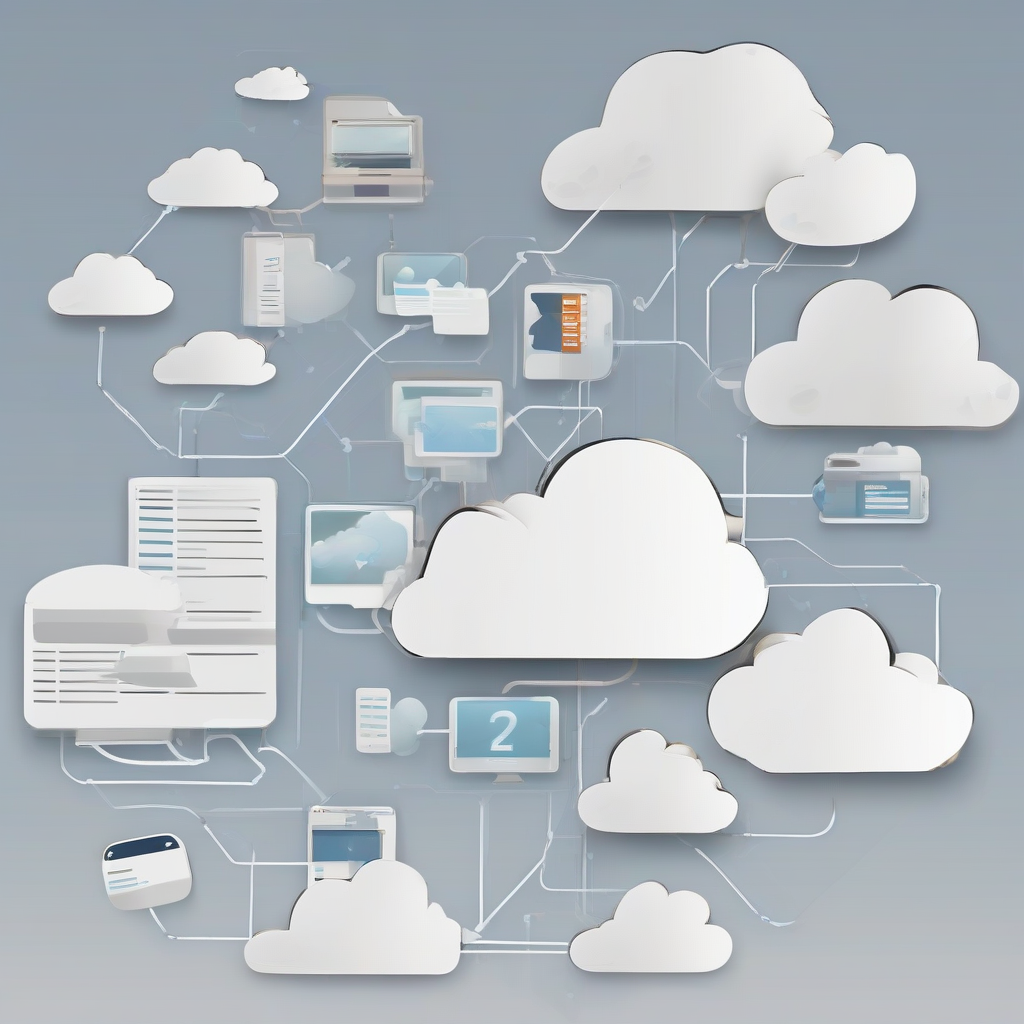Cloud Computing Providers Comparison: Choosing the Right Fit for Your Needs

Cloud Computing Providers Comparison: Choosing the Right Fit for Your Needs
In today's digital landscape, cloud computing has become an indispensable tool for businesses of all sizes. From storing data to running applications, the cloud offers unparalleled flexibility, scalability, and cost-effectiveness. However, with numerous cloud providers vying for your attention, choosing the right platform can seem daunting.
This comprehensive guide delves into the world of cloud computing providers, offering a detailed comparison of the major players: Amazon Web Services (AWS), Microsoft Azure, Google Cloud Platform (GCP), IBM Cloud, and Alibaba Cloud. We'll examine their strengths, weaknesses, pricing models, and key features to help you make an informed decision.
Key Considerations for Choosing a Cloud Provider
Before diving into the specifics of each provider, let's outline some crucial factors to consider:
- Business Needs and Objectives: Clearly define your specific requirements, such as scalability, security, compliance, and budget.
- Service Portfolio: Assess the breadth and depth of services offered, including compute, storage, networking, databases, and more.
- Pricing Models: Compare different pricing structures, such as pay-as-you-go, reserved instances, and spot instances.
- Geographic Availability: Evaluate data center locations and their proximity to your target audience.
- Security and Compliance: Verify compliance with relevant industry standards and regulations.
- Customer Support: Assess the level of support provided, including documentation, community forums, and technical assistance.
Major Cloud Providers: A Deep Dive
Amazon Web Services (AWS)
AWS is the undisputed leader in the cloud computing market, offering a comprehensive suite of services across various industries. Here's a breakdown of its key features:
- Wide Range of Services: AWS boasts the largest and most comprehensive service portfolio, including compute, storage, networking, databases, analytics, AI/ML, IoT, and more.
- Global Infrastructure: AWS has an extensive global network of data centers, ensuring low latency and high availability.
- Cost-Effectiveness: AWS offers flexible pricing models, including pay-as-you-go, reserved instances, and spot instances, allowing you to optimize costs.
- Strong Security: AWS prioritizes security with features like encryption, access control, and compliance certifications.
- Active Community and Support: AWS has a vibrant developer community and robust support channels, providing ample resources for assistance.
AWS Strengths
- Vast service portfolio and mature ecosystem
- Global infrastructure and high availability
- Competitive pricing models and cost optimization options
- Strong security features and compliance certifications
- Active community and comprehensive support resources
AWS Weaknesses
- Steep learning curve for beginners
- Can be complex to manage for large deployments
- Potentially higher costs compared to some competitors for certain services
Microsoft Azure
Azure is a powerful cloud platform from Microsoft, offering a wide range of services for enterprises and developers. Here's a closer look at its key attributes:
- Hybrid Cloud Integration: Azure excels in seamless integration with on-premises infrastructure, making it ideal for hybrid cloud environments.
- Enterprise-Grade Security: Azure offers robust security features, including encryption, access control, and compliance certifications.
- Strong Developer Tools: Azure provides comprehensive developer tools and a seamless integration with Microsoft's existing technologies.
- Focus on Data Analytics: Azure emphasizes data analytics and AI/ML capabilities, with powerful tools for data management and insights.
- Global Reach: Azure has a global network of data centers, ensuring global accessibility and low latency.
Azure Strengths
- Seamless hybrid cloud integration
- Enterprise-grade security and compliance
- Comprehensive developer tools and support for Microsoft technologies
- Strong focus on data analytics and AI/ML
- Global infrastructure and accessibility
Azure Weaknesses
- Can be more expensive than some competitors for certain services
- Limited service portfolio compared to AWS in some areas
- May require familiarity with Microsoft technologies
Google Cloud Platform (GCP)
GCP is a rapidly growing cloud provider from Google, known for its cutting-edge technologies and focus on data analytics, AI/ML, and machine learning.
- Innovative Technologies: GCP offers advanced technologies like BigQuery, Kubernetes, and TensorFlow, ideal for data-driven applications.
- Cost-Effective Pricing: GCP often provides competitive pricing, especially for compute and storage services.
- Strong Data Analytics: GCP excels in data analytics and AI/ML with powerful tools like BigQuery and Cloud AI Platform.
- Open Source Support: GCP is highly supportive of open-source technologies, making it attractive for developers.
- Global Infrastructure: GCP has a global network of data centers, ensuring low latency and high availability.
GCP Strengths
- Innovative technologies and focus on data analytics, AI/ML
- Cost-effective pricing for compute and storage services
- Strong open-source support and developer-friendly environment
- Global infrastructure and high availability
GCP Weaknesses
- Smaller service portfolio compared to AWS and Azure in some areas
- Steeper learning curve for beginners
- Limited integration with legacy systems
IBM Cloud
IBM Cloud offers a comprehensive suite of cloud services, with a strong focus on enterprise solutions, hybrid cloud integration, and security.
- Enterprise-Grade Solutions: IBM Cloud caters to large enterprises with a focus on security, compliance, and enterprise-grade services.
- Hybrid Cloud Expertise: IBM Cloud has extensive expertise in hybrid cloud integration, allowing seamless connection to on-premises infrastructure.
- Strong Security Focus: IBM Cloud prioritizes security with robust features and compliance certifications.
- Industry-Specific Solutions: IBM Cloud offers industry-specific solutions tailored to specific industries, such as healthcare, finance, and retail.
- Global Infrastructure: IBM Cloud has a global network of data centers, ensuring global accessibility and low latency.
IBM Cloud Strengths
- Focus on enterprise solutions and hybrid cloud integration
- Strong security features and compliance certifications
- Industry-specific solutions for various sectors
- Global infrastructure and high availability
IBM Cloud Weaknesses
- Smaller service portfolio compared to AWS, Azure, and GCP
- Can be more expensive than some competitors for certain services
- Steeper learning curve for beginners
Alibaba Cloud
Alibaba Cloud is a rapidly growing cloud provider from China, offering a wide range of services for businesses in Asia and globally.
- Strong Presence in Asia: Alibaba Cloud has a dominant market share in Asia, with a robust network of data centers in the region.
- Cost-Competitive Pricing: Alibaba Cloud often offers competitive pricing for its services, especially for businesses in Asia.
- Focus on Emerging Technologies: Alibaba Cloud emphasizes emerging technologies like AI/ML, blockchain, and IoT.
- Integration with Alibaba Ecosystem: Alibaba Cloud seamlessly integrates with other Alibaba services like e-commerce, payments, and logistics.
- Growing Global Reach: Alibaba Cloud is expanding its global presence with data centers in other regions.
Alibaba Cloud Strengths
- Strong presence in Asia and competitive pricing
- Focus on emerging technologies like AI/ML, blockchain, and IoT
- Integration with Alibaba ecosystem
- Growing global reach
Alibaba Cloud Weaknesses
- Limited global reach compared to other major providers
- Steeper learning curve for users outside Asia
- Limited English-language support in some areas
Choosing the Right Cloud Provider
Ultimately, choosing the right cloud provider depends on your specific needs and objectives. Here's a summary of key factors to consider:
- Business Needs: Identify your specific requirements, such as scalability, security, compliance, and budget.
- Service Portfolio: Ensure the provider offers the services you need, including compute, storage, networking, databases, and more.
- Pricing Models: Compare pricing structures and evaluate the cost-effectiveness for your specific use cases.
- Geographic Availability: Ensure the provider has data centers in regions relevant to your business.
- Security and Compliance: Verify compliance with industry standards and regulations.
- Customer Support: Evaluate the level of support provided, including documentation, community forums, and technical assistance.
By carefully considering these factors and comparing the strengths and weaknesses of each provider, you can make an informed decision that aligns with your business needs and objectives.
What's Your Reaction?
















